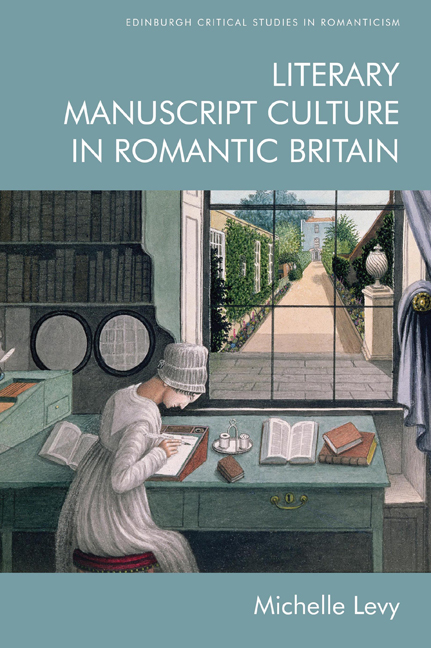Book contents
- Frontmatter
- Contents
- List of Illustrations
- Acknowledgements
- Dedication
- Introduction
- 1 Intentionality and the Romantic Literary Manuscript
- 2 Literary Reviews and the Reception of Manuscript Culture
- 3 Anna Barbauld’s Poetic Career in Script and Print
- 4 Lord Byron, Manuscript Poet
- 5 Jane Austen’s Fiction in Manuscript
- 6 Script’s Afterlives
- Afterword: Blake’s Digitised Printed Script
- References
- Index
- Plate Section
4 - Lord Byron, Manuscript Poet
Published online by Cambridge University Press: 08 October 2020
- Frontmatter
- Contents
- List of Illustrations
- Acknowledgements
- Dedication
- Introduction
- 1 Intentionality and the Romantic Literary Manuscript
- 2 Literary Reviews and the Reception of Manuscript Culture
- 3 Anna Barbauld’s Poetic Career in Script and Print
- 4 Lord Byron, Manuscript Poet
- 5 Jane Austen’s Fiction in Manuscript
- 6 Script’s Afterlives
- Afterword: Blake’s Digitised Printed Script
- References
- Index
- Plate Section
Summary
Jerome McGann, Byron's leading editor and scholar, has challenged ‘the text-centered procedures of twentieth-century criticism’, which, he asserts, ‘have never been able to read Byron's work in interesting ways’. Implementing his own theory of the socialisation of texts, McGann contends that a Byron poem can never be regarded ‘simply as an event in “language”’. Rather, McGann promotes the concept of a publication event, asking that contemporary readers take into account Byron's ‘actual practice of installing the poetical experience as a social and historical event’. ‘[T]hroughout his career’, McGann explains, ‘Byron's books cultivate direct communication with the people who are reading them … [h]is work assumes the presence of an audience that talks and listens.’ As in the previous chapter’s exploration of Barbauld's use of manuscript to transmit her poetry, which sought to reunite her poems with the material forms in which they were circulated and read, this chapter seeks to understand how and what Byron, for much of his career the most celebrated poet of the day, was ‘attempting to do’ by circulating his poetry in script. The assumption that Byron was primarily a print poet has meant that his extensive use of manuscript has never been systematically studied; nor has its impact on our understanding of his poetry and career. This chapter reconstructs the complex processes by which Byron's poems were composed and mediated in his lifetime, as he regularly chose manuscript for his confidential and satirical poems. By scrutinising Byron's practices of literary production and circulation in print and script, we heed McGann's call for new strategies of reading Byron's poetry.
This chapter founds its claims about Byron's use of manuscript circulation in part by adapting techniques from the ‘quantitative humanities’, what Franco Moretti has more broadly termed ‘distant reading’. To date, no effort has been made to quantify and analyse Byron's poetic output. For example, we do not know how many poems Byron printed in his lifetime in comparison with how many were left unprinted; nor do we know how many of his poems circulated in manuscript, how often he used private print, and the consequences, or how many of his manuscript poems were printed without his authorisation. With these questions in mind, this chapter experiments with different forms of quantitative analysis to chart Byron's poetic career over time.
- Type
- Chapter
- Information
- Literary Manuscript Culture in Romantic Britain , pp. 140 - 181Publisher: Edinburgh University PressPrint publication year: 2020



